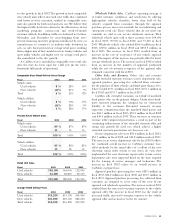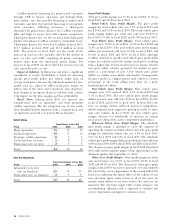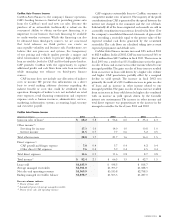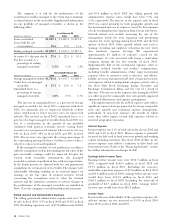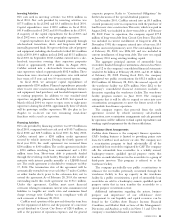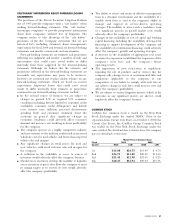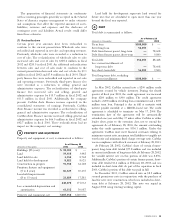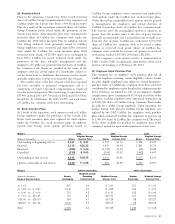CarMax 2003 Annual Report Download - page 29
Download and view the complete annual report
Please find page 29 of the 2003 CarMax annual report below. You can navigate through the pages in the report by either clicking on the pages listed below, or by using the keyword search tool below to find specific information within the annual report.
CARMAX 2003 27
CAUTIONARY INFORMATION ABOUT FORWARD-LOOKING
STATEMENTS
The provisions of the Private Securities Litigation Reform
Act of 1995 provide companies with a “safe harbor” when
making forward-looking statements. This “safe harbor”
encourages companies to provide prospective information
about their companies without fear of litigation. The
company wishes to take advantage of the “safe harbor”
provisions of the Act. Company statements that are not
historical facts, including statements about management’s
expectations for fiscal 2004 and beyond, are forward-looking
statements and involve various risks and uncertainties.
Forward-looking statements are estimates and projections
reflecting our judgment and involve a number of risks and
uncertainties that could cause actual results to differ
materially from those suggested by the forward-looking
statements. Although we believe that the estimates and
projections reflected in the forward-looking statements are
reasonable, our expectations may prove to be incorrect.
Investors are cautioned not to place undue reliance on any
forward-looking statements, which are based on current
expectations. Important factors that could cause actual
results to differ materially from estimates or projections
contained in our forward-looking statements include:
■In the normal course of business, we are subject to
changes in general U.S. or regional U.S. economic
conditions including, but not limited to, consumer credit
availability, consumer credit delinquency and default
rates, interest rates, inflation, personal discretionary
spending levels and consumer sentiment about the
economy in general. Any significant changes in
economic conditions could adversely affect consumer
demand and increase costs resulting in lower profitability
for the company.
■The company operates in a highly competitive industry
and new entrants to the industry could result in increased
wholesale costs for used vehicles and lower-than-expected
vehicle sales and margins.
■Any significant changes in retail prices for used and
new vehicles could result in lower sales and margins for
the company.
■A reduction in the availability or access to sources of
inventory would adversely affect the company’s business.
■Should excess inventory develop, the inability to liquidate
excess inventory at prices that allow the company to meet
its margin targets or to recover its costs would adversely
affect the company’s profitability.
■The ability to attract and retain an effective management
team in a dynamic environment and the availability of a
suitable work force is vital to the company’s ability to
manage and support its service-driven operating
strategies. The inability to attract such a workforce team
or a significant increase in payroll market costs would
adversely affect the company’s profitability.
■Changes in the availability or cost of capital and working
capital financing, including the availability of long-term
financing to support development of the company and
the availability of securitization financing, could adversely
affect the company’s growth and operating strategies.
■A decrease in the availability of appropriate real estate
locations for expansion would limit the expansion of the
company’s store base and the company’s future
operating results.
■The imposition of new restrictions or regulations
regarding the sale of products and/or services that the
company sells, changes in tax or environmental rules and
regulations applicable to the company or our
competitors, or any failure to comply with such laws or
any adverse change in such laws could increase costs and
affect the company’s profitability.
■We are subject to various litigation matters, which, if the
outcomes in any significant matters are adverse, could
negatively affect the company’s business.
COMMON STOCK
CarMax, Inc. common stock is traded on the New York
Stock Exchange under the symbol “KMX.” Prior to the
separation from Circuit City Stores on October 1, 2002, the
Circuit City Stores, Inc.-CarMax Group Common Stock
was traded on the New York Stock Exchange under the
same symbol. No dividend data is shown since the company
pays no dividends at this time.
Market Price of Common Stock
Fiscal 2003 2002
Quarter HIGH LOW HIGH LOW
1st $34.00 $24.75 $15.49 $ 4.70
2nd $26.75 $13.00 $20.50 $11.50
3rd $21.45 $12.90 $21.00 $ 9.20
4th $20.47 $12.94 $29.02 $19.35




